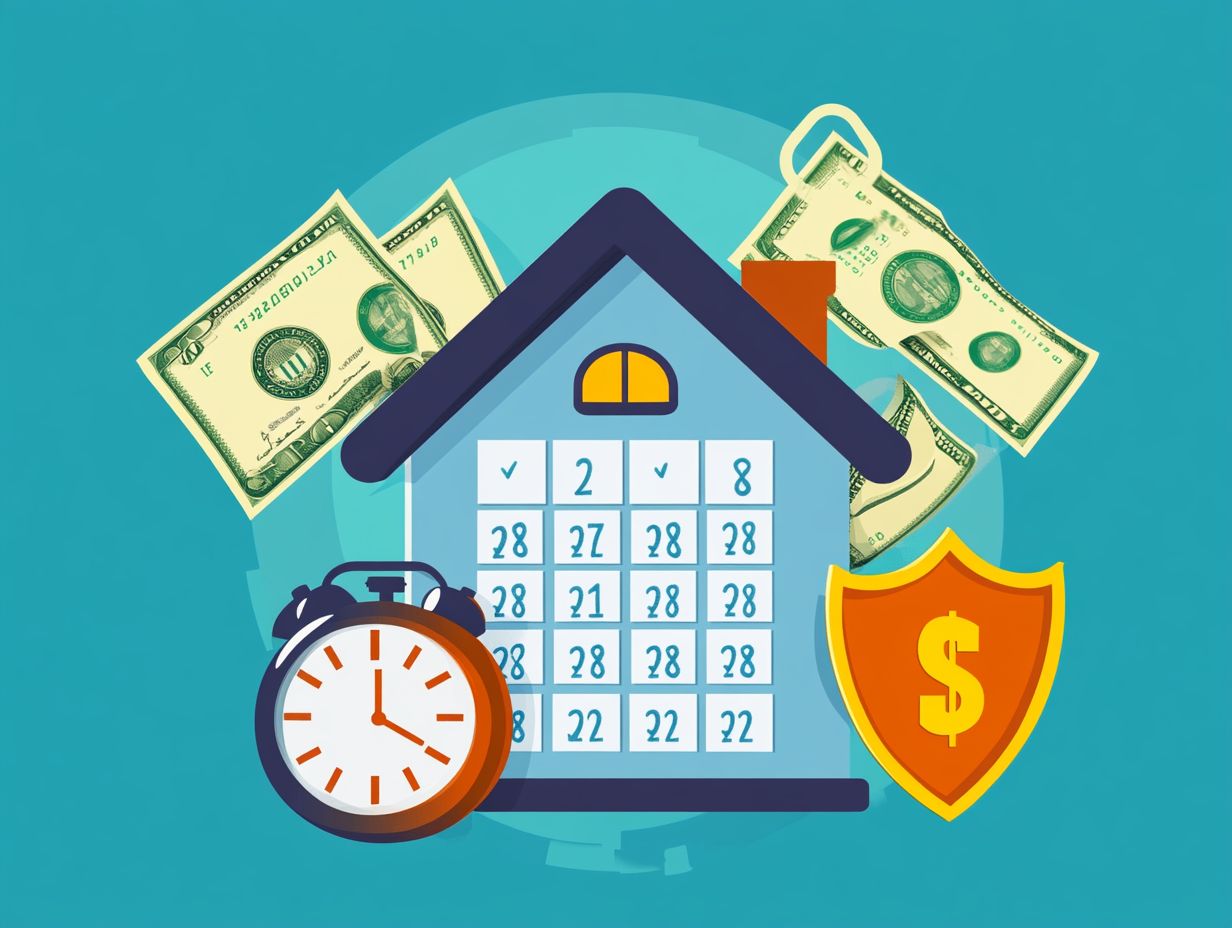What is the Grace Period for Home Insurance Payments?
Navigating home insurance can feel like a daunting task, especially when trying to understand payment timelines.
One crucial detail to be aware of is the grace period this invaluable buffer can save you from late fees and the risk of policy cancellation.
In this article, you ll discover the definition and purpose of grace periods, their typical durations across various insurance companies, and the consequences of missing a payment.
You ll also uncover options for extending grace periods and gain practical tips for managing your payments effectively.
With this knowledge, you can ensure your home insurance remains secure and hassle-free, giving you peace of mind.
Contents
- Key Takeaways:
- Understanding Home Insurance Grace Periods
- Typical Length of Grace Periods
- Consequences of Missing a Payment
- Options for Extending Grace Periods
- Tips for Managing Home Insurance Payments
- Frequently Asked Questions
- What is the Grace Period for Home Insurance Payments?
- Is the Grace Period the Same for All Home Insurance Policies?
- How Long is the Typical Grace Period for Home Insurance Payments?
- What Happens if I Miss the Grace Period for Home Insurance Payments?
- Can I Request an Extension for the Grace Period for Home Insurance Payments?
- Is There a Fee for Using the Grace Period for Home Insurance Payments?
Key Takeaways:

The grace period for home insurance payments is a set amount of time after the due date during which payments can still be made without penalty. The length of the grace period varies between insurance companies, so know your grace period to avoid late fees!
Understanding Home Insurance Grace Periods
Homeowner’s insurance is vital for safeguarding your property and your money, and grasping the concept of grace periods is key to ensuring uninterrupted coverage.
A grace period is essentially a lifeline a window of time after a missed payment during which you can settle your dues without risking a gap in protection or cancellation of your policy.
This timeframe allows you to navigate your financial choices while keeping your insurance protection intact against potential risks, such as property damage or liability claims.
Typical Length of Grace Periods
The grace periods for homeowner’s insurance can vary widely based on the insurance company and the specific terms of your policy. Typically, these periods range from 10 to 30 days for missed payments.
It s important to note that different insurers may provide varying lengths of grace periods, impacting your premiums and overall coverage options. Being aware of these variations helps you make informed financial decisions regarding your insurance coverage, preventing potential lapses that could lead to increased rates or even forced insurance.
Variances Between Insurance Companies
Grace periods can vary significantly between insurance companies, each defining specific terms in their homeowner’s insurance policies. While some may offer a generous 30-day grace period, others may limit it to just 10 days, which could affect your financial protection.
Understanding these differences is essential when selecting a home insurance policy, as they can influence your coverage options and overall peace of mind. Variations often arise from individual company policies, market practices, and competitive strategies designed to attract and retain customers.
For instance, insurers might adjust their grace periods based on their underwriting criteria or risk assessment models, which can subtly steer your choices regarding insurance coverage.
State regulations and market demands may also prompt companies to modify their policies, offering longer or shorter grace periods to remain competitive. Ultimately, it s crucial for homeowners to evaluate these factors carefully, as the length of the grace period can significantly affect your financial security and the likelihood of maintaining uninterrupted coverage.
Consequences of Missing a Payment

Missing a payment on your homeowner’s insurance can lead to serious consequences. You could incur late fees, face potential policy cancellation, and experience a gap in protection, leaving you financially vulnerable.
When you delay payments, insurance companies may issue a cancellation notice, which can tarnish your insurance history and create complications when seeking coverage in the future.
A gap in protection can lead to higher premiums and increased risks, such as insurance fraud. It’s crucial to understand the implications of missed payments to safeguard your financial well-being.
Late Fees and Policy Cancellation
Late fees often appear from insurance companies when you miss a payment deadline, adding a financial strain on top of the already looming threat of policy cancellation.
If you don t make those payments within the grace period the time allowed to make payments without penalties your insurance policy could face cancellation. This could lead to a lapse in coverage that jeopardizes your financial protection as a homeowner.
Understanding late fees and cancellation policies is important to maintain a solid insurance history. These fees not only swell your immediate out-of-pocket expenses but can also affect your future premiums.
Insurance companies frequently interpret late payments as a red flag, which can result in higher rates at renewal. Know the administrative processes involved, such as receiving notifications and understanding cancellation timelines, as these can differ among insurers.
Ultimately, making timely payments ensures uninterrupted coverage and helps you nurture a positive relationship with your insurance provider. Avoiding accidental lapses can prevent significant financial consequences.
Options for Extending Grace Periods
As a homeowner facing a missed payment on your insurance policy, you may find several options to extend grace periods. These options help you maintain essential coverage and sidestep financial pitfalls.
Many insurance companies are accommodating and may offer flexible payment plans or guidance from seasoned insurance professionals to help you stay compliant with insurance requirements.
By understanding the reinstatement policy and potential adjustments to your coverage, you position yourself to make informed decisions during challenging financial times.
Payment Plans and Extensions
Many insurance companies provide payment plans and extensions to assist you in managing your insurance premiums, especially during financial hardships. These plans offer a structured approach to paying off overdue amounts within a designated timeframe.
This prevents any lapse in coverage and ensures your financial protection remains intact.
It s essential to communicate with your insurance provider to explore available options and ensure compliance with all necessary requirements.
Payment plans can be tailored to fit your individual circumstances ranging from monthly installments to quarterly payments allowing you to distribute costs evenly over time.
Some companies may even offer the flexibility of deferred payments or grace periods for those facing acute financial strain.
Maintaining timely communication with your insurance provider is crucial; it helps you stay informed about these options and avoids any risk of missing deadlines.
If you find yourself navigating financial challenges, consider documenting your situation, seeking advice from financial professionals, and exploring government programs aimed at alleviating insurance costs. This proactive approach can significantly enhance your ability to secure peace of mind during these trying times.
Tips for Managing Home Insurance Payments

Effectively managing your home insurance payments is essential for safeguarding your assets and ensuring uninterrupted coverage. Here are some strategies that can streamline this process:
Consider using smartphone reminders and integrating automated payment options. These tools can help you make timely payments with ease, significantly reducing the likelihood of late fees and lapses in coverage.
By following a comprehensive insurance guide and exploring various coverage options, you can make informed financial decisions that ultimately enhance your financial protection.
Take control of your payments today to avoid penalties!
Strategies for Avoiding Late Payments
Implementing effective strategies to avoid late payments on your homeowners insurance can greatly enhance your financial stability. Consider setting up smartphone reminders and using automated payment systems.
Engaging in financial planning is also crucial. These steps can ensure your insurance payments are made on time, preventing costly late fees and lapses in coverage.
Understanding your insurance obligations is key to managing your finances successfully! Developing a detailed budget gives you a clearer picture of your monthly expenses, allowing you to allocate sufficient funds for insurance premiums.
Using financial management apps or tools can help you track due dates and manage your overall spending effectively. Regularly reviewing your insurance policies keeps you informed about any changes in premiums or coverage requirements, enabling you to make timely adjustments.
By maintaining open communication with your insurance providers and asking questions whenever uncertainties arise, you can navigate your obligations with ease, cultivating a proactive approach to your financial management.
Frequently Asked Questions
What is the Grace Period for Home Insurance Payments?
The grace period for home insurance payments refers to the amount of time you have to make your insurance payment after the due date has passed. It is a period where your payment can still be accepted without any late fees or penalties.
Is the Grace Period the Same for All Home Insurance Policies?

No, the grace period can vary depending on the insurance company and the specific policy. It is important to check your policy documents or contact your insurance provider to determine the exact grace period for your policy.
How Long is the Typical Grace Period for Home Insurance Payments?
The typical grace period for home insurance payments is usually 30 days. However, this can vary from one insurance company to another. To learn more about the specifics, including what constitutes the home insurance grace period, some may offer a longer grace period, while others may have a shorter one.
What Happens if I Miss the Grace Period for Home Insurance Payments?
If you miss the grace period for your home insurance payments, your policy may be considered lapsed or canceled. This means that you will no longer have insurance coverage for your home. It is important to make your payments on time to avoid any coverage gaps.
Can I Request an Extension for the Grace Period for Home Insurance Payments?
In some cases, you may be able to request an extension for the grace period. This will depend on your insurance company and their policies. It is best to contact them as soon as possible to discuss your options if you are unable to make your payment within the grace period.
Is There a Fee for Using the Grace Period for Home Insurance Payments?
Typically, there is no additional fee for using the grace period for home insurance payments. However, if you consistently rely on the grace period, your insurance company may view this as a risk and could increase your premiums in the future.
Take charge of your insurance payments and financial planning today for a worry-free tomorrow!





